I’ve been thinking about addiction lately, and cannot help seeing my students constantly gazing into their palms as anything but problematic. As I’ve been musing about technology in the classroom this year, basic concerns about screen-time, as well as ideas about maximizing the technology as a benefit for education have come up, but in March (the longest and toughest month for everyone involved in education) concerning addictive behavior is at the forefront.
Students cannot seem to stop looking at their phone. I get the impulse, and spend a great deal of time on computers as well, less on the phone because of personal dislike of the medium. Sven Birkerts and Nicholas Carr worried about this years ago, and the research started in the recent past is playing out their fears—as evidenced in this study by Lin and Zhou: “Taken together, [studies show] internet addiction is associated with structural and functional changes in brain regions involving emotional processing, executive attention, decision making, and cognitive control.” Another study recently brought to my attention by a child occupational therapist, shows us that screens light up the same regions of the brain that cocaine sets afire. And science shows us addictive video games may change children’s brains in the same way as drugs and alcohol.
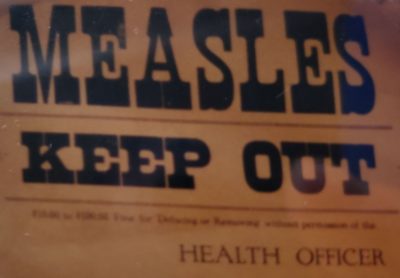 The minute my mom was diagnosed, a quarantine poster was slapped on the front door of their house. When her dad came home from work, he wasn’t allowed inside his own home. That’s how seriously they took quarantines in 1938.
The minute my mom was diagnosed, a quarantine poster was slapped on the front door of their house. When her dad came home from work, he wasn’t allowed inside his own home. That’s how seriously they took quarantines in 1938.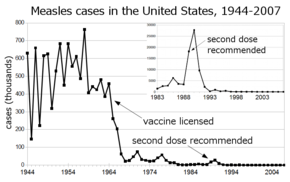
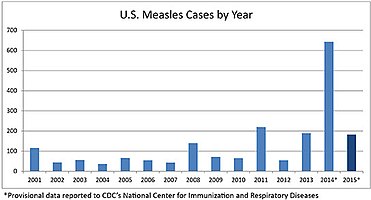
 Which is truth?
Which is truth?
 Imagine that you are that armed teacher. Maybe you have hours of target shooting. Maybe you hunt. Maybe you are very comfortable with your weapon.
Imagine that you are that armed teacher. Maybe you have hours of target shooting. Maybe you hunt. Maybe you are very comfortable with your weapon.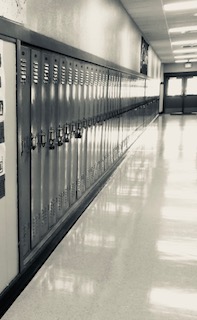 Don’t get me wrong; we need all of the supports mentioned in the proposal. We need more counselors in our buildings. We need plans for school safety that are actionable. We need all educational personnel to be trained to recognize and respond to symptoms of emotional distress. But, does anyone take time to wonder how we could prevent getting to the point where we are responding to distress?
Don’t get me wrong; we need all of the supports mentioned in the proposal. We need more counselors in our buildings. We need plans for school safety that are actionable. We need all educational personnel to be trained to recognize and respond to symptoms of emotional distress. But, does anyone take time to wonder how we could prevent getting to the point where we are responding to distress?


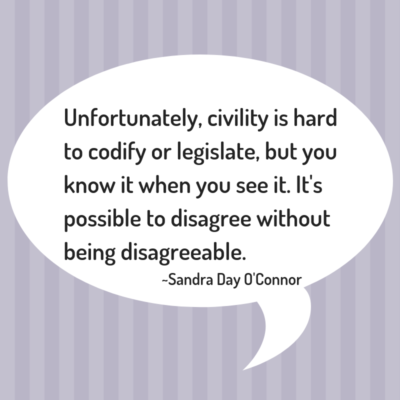 Civil discourse is the engagement in conversation to enhance understanding. It requires respect for all others involved, without judgment. You cannot conduct civil discourse if it is obvious that you question the good sense of your peers. You cannot conduct yourself with hostility, sarcasm, mockery, or excess persuasive language. You have to accept the views of others as valid, despite your disagreement.
Civil discourse is the engagement in conversation to enhance understanding. It requires respect for all others involved, without judgment. You cannot conduct civil discourse if it is obvious that you question the good sense of your peers. You cannot conduct yourself with hostility, sarcasm, mockery, or excess persuasive language. You have to accept the views of others as valid, despite your disagreement. As teachers, the urge to stay out of it, to be apolitical and neutral is strong. We don’t want to offend our students, their families, or our communities. However, we must model that we all have views and ideas, and how we express them is important. We do not force our views on others, but, instead, we invite discourse. Our students need to learn to share their ideas and listen to their peers. They need to understand the importance of researching the issues and verifying their sources. They need to practice protocols of debate and dialogue that guide them to be supportive listeners, even when they disagree.
As teachers, the urge to stay out of it, to be apolitical and neutral is strong. We don’t want to offend our students, their families, or our communities. However, we must model that we all have views and ideas, and how we express them is important. We do not force our views on others, but, instead, we invite discourse. Our students need to learn to share their ideas and listen to their peers. They need to understand the importance of researching the issues and verifying their sources. They need to practice protocols of debate and dialogue that guide them to be supportive listeners, even when they disagree.
